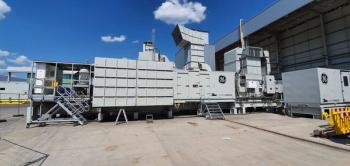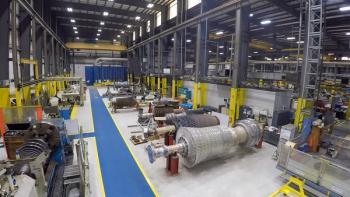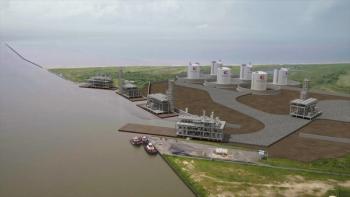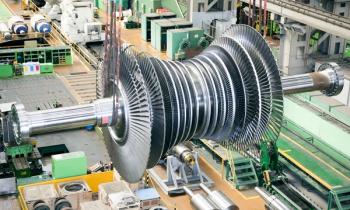
- November/December 2024
- Volume 65
- Issue 7
Product Spotlight: Siemens Energy: Turbomachinery-Based Technologies for Decarbonization
Siemens Energy is developing three technologies—an advanced rotor hydrogen compressor, a Turbo Heater, and a rotating olefins cracker—to drive the energy transition and reduce carbon emissions.
As industrial decarbonization drives full speed ahead, innovations in rotating equipment are needed at scale to accelerate the energy transition and close technological gaps.
Siemens Energy opened a new laboratory in Redmond, WA, focused on developing and testing turbomachinery-based technologies designed to support industrial decarbonization at scale. It is commercializing several rotating equipment technologies to accelerate the energy transition. Three technologies in the early stages of commercialization are being developed at the facility: an advanced rotor hydrogen compressor, a Turbo Heater, and a rotating olefins cracker (ROC).
Advanced Rotor Hydrogen Compressor
Utilizing turbocompressors for low-mole-weight gases like hydrogen presents several technical challenges. A large amount of specific work is required to achieve meaningful pressure ratios, as there is a comparatively lower pressure rise per stage relative to heavier gases, such as methane or CO2.
Siemens Energy’s STC-SVm single-shaft turbocompressor with advanced rotor technology was designed to address these limitations. The platform utilizes a multi-stage rotor that permits circumferential speeds at the impeller outer diameter of up to 600 m/s without exceeding material stress limits as specified in API 617. This enables compressor stage count and a reduced footprint by up to 50% compared to a conventional turbocompressor solution in low-mole-weight gas applications.
The STC-SVm platform can operate on 100% hydrogen and applies to all major industrial markets with case ratings up to 350 bar (g) and discharge temperatures up to 193°C. It is suited for applications with high-hydrogen flows where installing several reciprocating compressor packages is uneconomical or impractical due to footprint constraints. In high-volume applications where high operating flexibility is required, the STC-SVm can also be combined with reciprocating units in hybrid compression packages to reduce total cost of ownership.
The development and testing of the new rotor technology included operation on 100% helium in a closed loop. Further validation testing and additional technology development using 100% hydrogen will continue in the new test facility. The first field implementation will take place in the United Kingdom, where a three-stage advanced rotor compressor will boost an underground natural gas-hydrogen flow loop.
Turbo Heater
Siemens Energy’s Turbo Heater is a turbomachine that employs high-speed gas dynamics to directly heat gas through a shock wave train. The machine is driven by an electric motor and does not require the direct burning of fossil fuels or a heat exchanger. With the Turbo heater, fluid is accelerated to high velocities using several stages, each consisting of rotating blades followed by stator vanes redirecting the flow into subsequent stages. The flow is then directed to a stationary diffuser that rapidly reduces the flow velocity and converts the fluid’s kinetic energy into thermal energy, producing a rapid increase in static temperature.
The Turbo Heater also features scalability: The flow capacity and therefore the amount of energy transferred to the flow is approximately a quadratic function of linear dimensions. This means doubling the machine’s diameter results in a flow-capacity increase of roughly four times.
Proof-of-Concept Test
A 1.6 MW prototype successfully completed a proof-of-concept test campaign covering a wide range of operating conditions. The test program demonstrated outlet temperatures above 700° C, which matched the pre-test performance predictions. A four-hour API mechanical run test was also completed. Achievable temperature levels are projected to reach up to 1000° C using materials and design practices proven in gas turbines and other turbomachinery products.
Next year, the first field demonstration project will take place at a pulp and paper mill in Washington, providing process heat to a rotary kiln. Siemens Energy was awarded a $1.7 M matching grant from the Washington State Clean Energy Fund to support this effort.
Rotating Olefins Cracker
The ROC is a turbomachine that utilizes the same fluid dynamic principles as the Turbo Heater to produce olefins without the combustion of fossil fuels. The technology is being developed as part of a joint effort between Siemens Energy and Technip Energies. The two companies have already validated the fundamentals of reactor chemistry in a laboratory setting and successfully tested a turbomachine prototype operating with inert gas.
Like the Turbo Heater, the ROC is driven by an electric motor or a hydrogen-fired gas turbine. Kinetic energy produced via rotation is converted rapidly to heat through a controlled shock wave, creating a near-instantaneous temperature rise in the gas to initiate pyrolysis reactions without heat transfer from heat exchanger surfaces.
ROC Prototype
In addition to eliminating fossil-fuel combustion, the rapid temperature increase optimizes the reaction volume to better control chemical kinetics and maximize the yield of the desired high-value chemicals compared to the gradual heating and long residence times dictated by the bulk volume of long tube bundles in conventional furnace heating coils. Eliminating the reliance on surface heat exchange in tube coils will lower the propensity for coke formation. The ROC is compact, highly scalable, and can convert large quantities of energy to heat in a small footprint.
Additional Lab Work
Siemens Energy’s Redmond Turbomachinery laboratory accelerates the company’s goal to progress industrial decarbonization. In addition to the high-speed rotor hydrogen compressor, Turbo Heater, and ROC, the team is also developing several other decarbonization technologies for power generation and energy storage using turbomachinery-based solutions.
Articles in this issue
12 months ago
Myth: Hydrogen Handling is Effortlessabout 1 year ago
Turbomachinery International: November/December 2024Newsletter
Power your knowledge with the latest in turbine technology, engineering advances, and energy solutions—subscribe to Turbomachinery International today.




